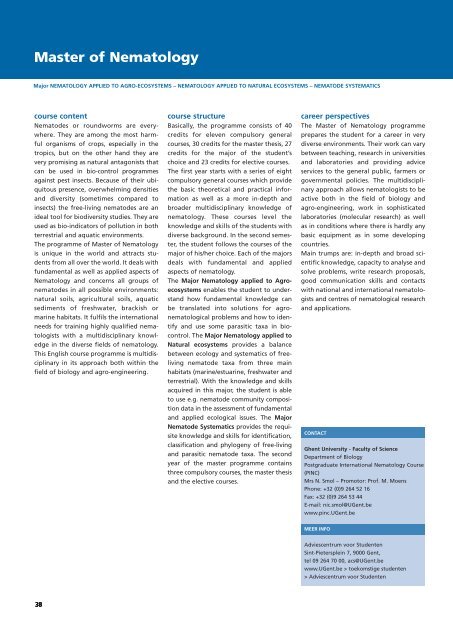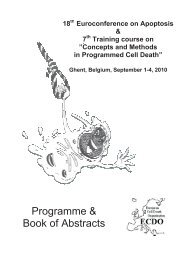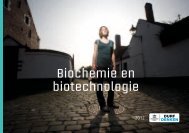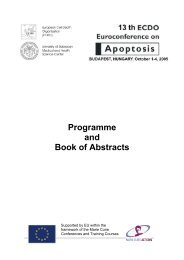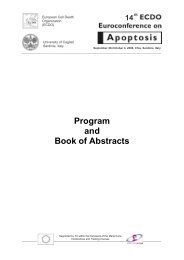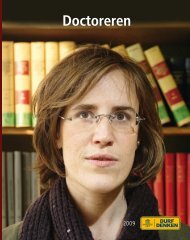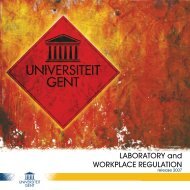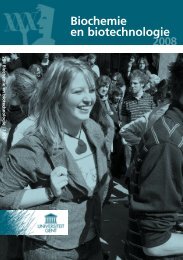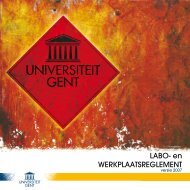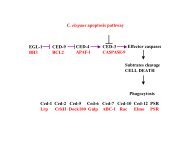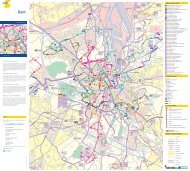Masters faculteit Wetenschappen - DMBR - Universiteit Gent
Masters faculteit Wetenschappen - DMBR - Universiteit Gent
Masters faculteit Wetenschappen - DMBR - Universiteit Gent
You also want an ePaper? Increase the reach of your titles
YUMPU automatically turns print PDFs into web optimized ePapers that Google loves.
Master of Nematology<br />
Major NEMATOLOGY APPLIED TO AGRO-ECOSYSTEMS – NEMATOLOGY APPLIED TO NATURAL ECOSYSTEMS – NEMATODE SYSTEMATICS<br />
course content<br />
Nematodes or roundworms are everywhere.<br />
They are among the most harmful<br />
organisms of crops, especially in the<br />
tropics, but on the other hand they are<br />
very promising as natural antagonists that<br />
can be used in bio-control programmes<br />
against pest insects. Because of their ubiquitous<br />
presence, overwhelming densities<br />
and diversity (sometimes compared to<br />
insects) the free-living nematodes are an<br />
ideal tool for biodiversity studies. They are<br />
used as bio-indicators of pollution in both<br />
terrestrial and aquatic environments.<br />
The programme of Master of Nematology<br />
is unique in the world and attracts students<br />
from all over the world. It deals with<br />
fundamental as well as applied aspects of<br />
Nematology and concerns all groups of<br />
nematodes in all possible environments:<br />
natural soils, agricultural soils, aquatic<br />
sediments of freshwater, brackish or<br />
marine habitats. It fulfils the international<br />
needs for training highly qualified nematologists<br />
with a multidisciplinary knowledge<br />
in the diverse fields of nematology.<br />
This English course programme is multidisciplinary<br />
in its approach both within the<br />
field of biology and agro-engineering.<br />
course structure<br />
Basically, the programme consists of 40<br />
credits for eleven compulsory general<br />
courses, 30 credits for the master thesis, 27<br />
credits for the major of the student’s<br />
choice and 23 credits for elective courses.<br />
The first year starts with a series of eight<br />
compulsory general courses which provide<br />
the basic theoretical and practical information<br />
as well as a more in-depth and<br />
broader multidisciplinary knowledge of<br />
nematology. These courses level the<br />
know ledge and skills of the students with<br />
diverse background. In the second semester,<br />
the student follows the courses of the<br />
major of his/her choice. Each of the majors<br />
deals with fundamental and applied<br />
aspects of nematology.<br />
The Major Nematology applied to Agroecosystems<br />
enables the student to understand<br />
how fundamental knowledge can<br />
be translated into solutions for agronematological<br />
problems and how to identify<br />
and use some parasitic taxa in biocontrol.<br />
The Major Nematology applied to<br />
Natural ecosystems provides a balance<br />
between ecology and systematics of freeliving<br />
nematode taxa from three main<br />
habitats (marine/estuarine, freshwater and<br />
terrestrial). With the knowledge and skills<br />
acquired in this major, the student is able<br />
to use e.g. nematode community composition<br />
data in the assessment of fundamental<br />
and applied ecological issues. The Major<br />
Nematode Systematics provides the requisite<br />
knowledge and skills for identification,<br />
classification and phylogeny of free-living<br />
and parasitic nematode taxa. The second<br />
year of the master programme contains<br />
three compulsory courses, the master thesis<br />
and the elective courses.<br />
career perspectives<br />
The Master of Nematology programme<br />
prepares the student for a career in very<br />
diverse environments. Their work can vary<br />
between teaching, research in universities<br />
and laboratories and providing advice<br />
services to the general public, farmers or<br />
governmental policies. The multidisciplinary<br />
approach allows nematologists to be<br />
active both in the field of biology and<br />
agro-engineering, work in sophisticated<br />
laboratories (molecular research) as well<br />
as in conditions where there is hardly any<br />
basic equipment as in some developing<br />
countries.<br />
Main trumps are: in-depth and broad scientific<br />
knowledge, capacity to analyse and<br />
solve problems, write research proposals,<br />
good communication skills and contacts<br />
with national and international nematologists<br />
and centres of nematological research<br />
and applications.<br />
CONTACT<br />
Ghent University - Faculty of Science<br />
Department of Biology<br />
Postgraduate International Nematology Course<br />
(PINC)<br />
Mrs N. Smol – Promotor: Prof. M. Moens<br />
Phone: +32 (0)9 264 52 16<br />
Fax: +32 (0)9 264 53 44<br />
E-mail: nic.smol@U<strong>Gent</strong>.be<br />
www.pinc.ugent.be<br />
MEER INFO<br />
Adviescentrum voor Studenten<br />
Sint-Pietersplein 7, 9000 <strong>Gent</strong>,<br />
tel 09 264 70 00, acs@U<strong>Gent</strong>.be<br />
www.U<strong>Gent</strong>.be > toekomstige studenten<br />
> Adviescentrum voor Studenten<br />
38


